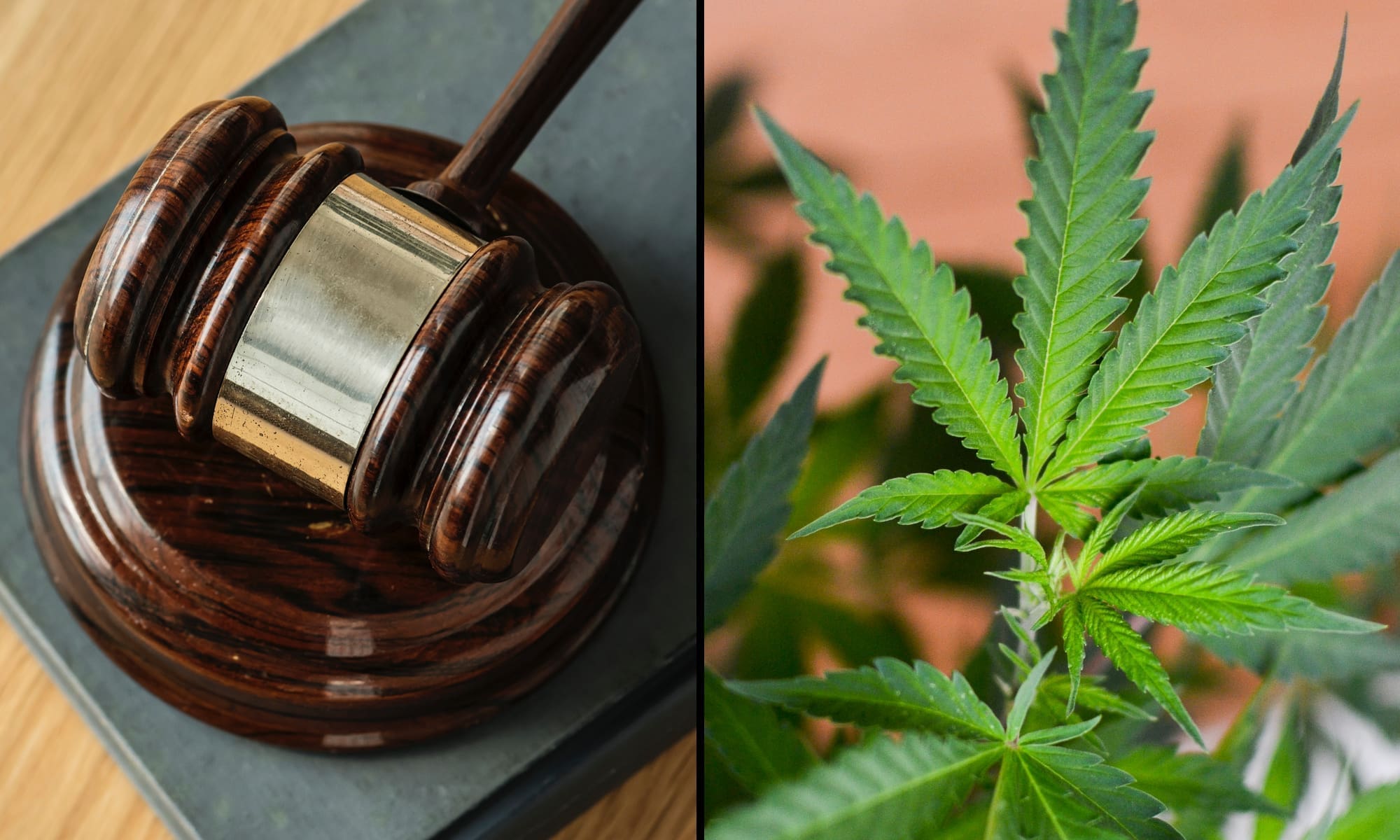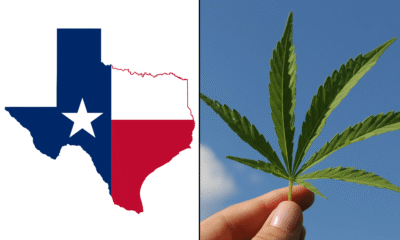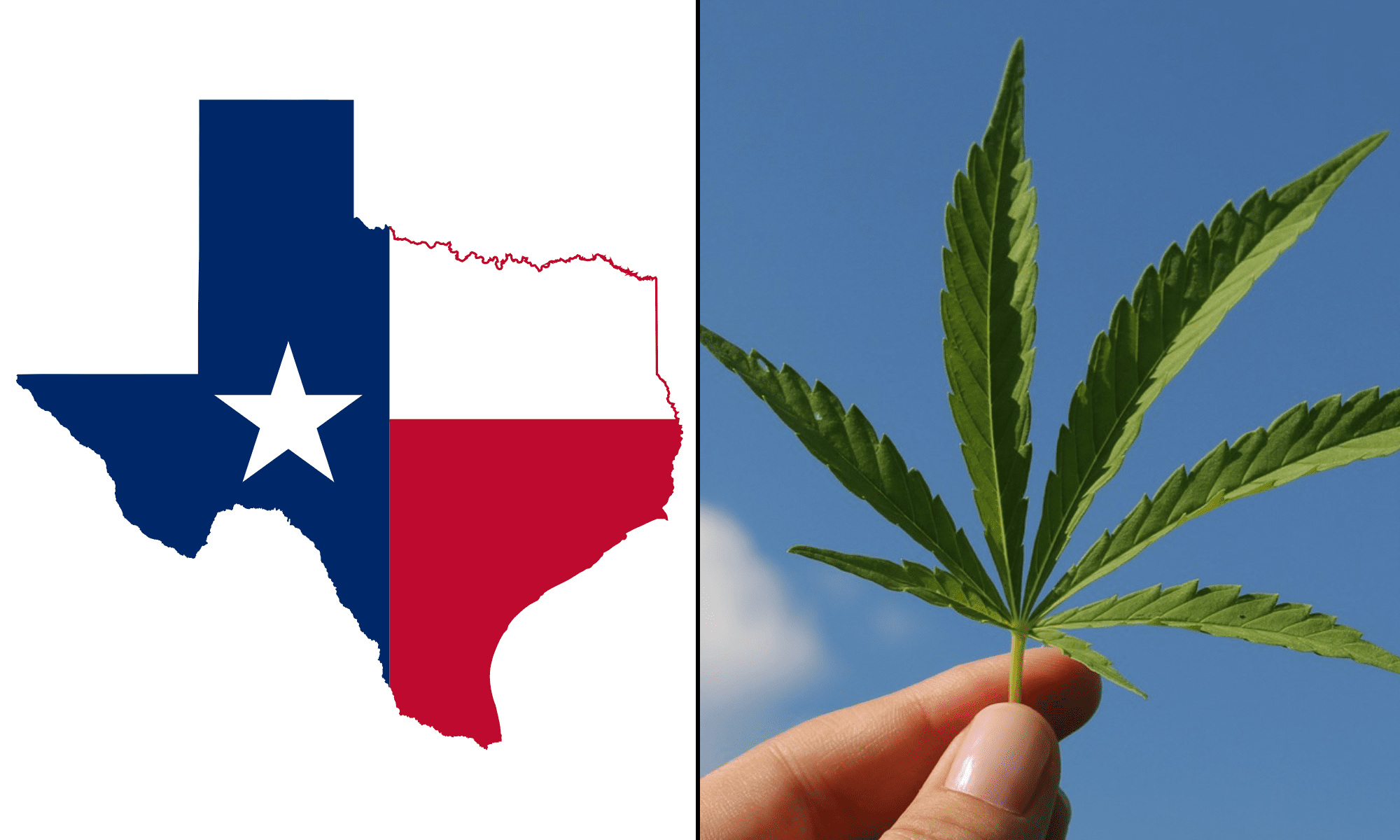featured
Federal Appeals Court Says Government Must Prove Marijuana Users ‘Pose A Risk’ Of Danger To Justify Gun Ban
Published
3 weeks agoon

A federal appeals court has ruled that the government must prove that people who use marijuana “pose a risk of future danger” if it wants to justify applying a law banning cannabis consumers from owning firearms.
In its opinion on Tuesday, the U.S. Court of Appeals for the Tenth Circuit sided with a federal district court that dismissed an indictment against Jared Michael Harrison, who was charged in Oklahoma in 2022 after police discovered cannabis and a handgun in his vehicle during a traffic stop.
The case has now been remanded to that lower court, which determined that the current statute banning “unlawful” users of marijuana from possessing firearms, known as 922(g)(3), violates the Second Amendment of the Constitution.
The Justice Department appealed that ruling in 2023, sending it to the Tenth Circuit. That three-judge panel said they “agree with much of the district court’s analysis” of the legal considerations, including its challenge to the federal government’s claims that there is historically analogous precedent substantiating the firearm ban for cannabis consumers.
Part of DOJ’s argument was that the ban is historically consistent with prohibitions on gun ownership by people with mental illness. The appeals court said “the government cannot justify” the current policy based on that standard.
“We agree with the district court and Mr. Harrison. On the record before us, the government has not shown laws disarming the mentally ill are relevant historical analogues. The government suggests laws disarming the mentally ill reveal a principle that legislatures may disarm those who are not ‘responsible,’ ‘ordinary,’ or able to exercise ‘self-control.’ This analysis relies on constructs the Supreme Court has explicitly refused to endorse.”
Further, the court said “Mr. Harrison is among ‘the People’ protected by the Second Amendment, so the government must justify § 922(g)(3) by showing it is consistent with our tradition of firearm regulation; § 922(g)(3) lacks a distinctly similar regulation despite addressing a persistent societal problem, which is relevant evidence it violates the Second Amendment as applied.”
“On the record before us, the government has not shown laws disarming the mentally ill are relevant historical analogues.” pic.twitter.com/cPSplW4BlM
— Firearms Policy Coalition (@gunpolicy) August 26, 2025
Judge Veronica Rossman, who authored the opinion, noted that the court departs in a “narrow way” from the district court’s ruling, as judges “hold the historical tradition supports a principle that legislatures may disarm those believed to pose a risk of future danger.”
“And we further hold the district court must inquire into the government’s assertion that non-intoxicated marijuana users pose a risk of danger,” it said.
“We hold the historical tradition supports a principle that legislatures may disarm those believed to pose a risk of future danger. And we further hold the district court must inquire into the government’s assertion that non-intoxicated marijuana users pose a risk of danger.” pic.twitter.com/VWXj6VEYHt
— Firearms Policy Coalition (@gunpolicy) August 26, 2025
The lower court largely based his initial decision on an interpretation of a U.S. Supreme Court ruling in which the justices generally created a higher standard for policies that seek to impose restrictions on gun rights.
The ruling states that any such restrictions must be consistent with the historical context of the Second Amendment’s original 1791 ratification.
The historical analogues that the Justice Department relied on to make the case that the ban is consistent included references to antiquated case law preventing Catholics, loyalists, slaves and Indians from having guns.
The circuit court, for its part, said that “the government must show non-intoxicated marijuana users pose a risk of future danger” to support the current policy. “This inquiry, which may involve fact finding, is best suited for the district court.”
This opinion comes nearly a year after the Tenth Circuit heard oral arguments in the case, with judges questioning not only the firearms prohibition itself but also whether it was within the scope of the appeals panel’s power to review the underlying lower court’s decision. Ultimately, they determined that they did possess that authority.
Meanwhile, in the U.S. Court of Appeals for the Eleventh District, judges recently ruled in favor of medical cannabis patients who want to exercise their Second Amendment rights to possess firearms.
In the background of these developments, the U.S. Supreme Court is considering a series of cases challenging the gun ban for people who use marijuana.
The Trump administration has asked the high court to hear one of five relevant cases to resolve conflicting lower court decisions on gun rights for cannabis consumers and other illegal drugs from owning firearms and uphold the prohibition.
In the request, the solicitor general reiterated his position that, despite recent appeals court decisions calling into question the constitutionality of the firearms ban for people who use cannabis—even in compliance with state law—the restriction is nevertheless lawful.
As a recent report from the Congressional Research Service (CRS) explained the current legal landscape, a growing number of federal courts are now “finding constitutional problems in the application of at least some parts” of the firearms prohibition.
In a ruling last month, for instance, a three-judge panel for the U.S. Court of Appeals for the Eighth Circuit vacated a defendant’s conviction and remanded the case back to a district court, noting that a retrial before a jury may be necessary to determine whether cannabis in fact caused the defendant to be dangerous or pose a credible threat to others.
The new Eighth Circuit opinion appears to differ from a recent Third Circuit ruling in that the new decision says that not every application of 922(g)(3) “require[s] an individualized factual determination,” explaining that such determinations wouldn’t be necessary if the government could demonstrate that a particular drug made an entire class of users dangerous.
By contrast, the Third Circuit earlier this month said in a published opinion that district courts must make “individualized judgments” to determine whether 922(g)(3) is constitutional as applied to particular defendants.
The appeals panel ruled that while a person “need not have harmed someone, threatened harm, or otherwise acted dangerously to justify his disarmament,” the history of gun laws in the country requires that “district courts must make individualized judgments and conclude that disarming a drug user is needed to address a risk that he would pose a physical danger to others.”
Judges in that case noted that historical restrictions on gun ownership under “drunkenness and lunacy laws” in the U.S. “were still always based on an ‘individualized assessment’ rather than a categorical judgment.”
Earlier this year, a federal judge in Rhode Island ruled that the ban was unconstitutional as applied to two defendants, writing that the government failed to establish that the “sweeping” prohibition against gun ownership by marijuana users was grounded in historical precedent.
A federal judge in El Paso separately ruled late last year that the government’s ongoing ban on gun ownership by habitual marijuana users is unconstitutional in the case of a defendant who earlier pleaded guilty to the criminal charge. The court allowed the man to withdraw the plea and ordered that the indictment against him be dismissed.
—
Marijuana Moment is tracking hundreds of cannabis, psychedelics and drug policy bills in state legislatures and Congress this year. Patreon supporters pledging at least $25/month get access to our interactive maps, charts and hearing calendar so they don’t miss any developments.![]()
Learn more about our marijuana bill tracker and become a supporter on Patreon to get access.
—
Meanwhile, at an NRA conference in 2023, Trump suggested there might be a link between the use of “genetically engineered” marijuana and mass shootings. He listed a number of controversial and unproven factors that he said at the time he would direct the Food and Drug Administration (FDA) to investigate as possibly causing the ongoing scourge of mass shooting afflicting the country.
“We have to look at whether common psychiatric drugs, as well as genetically engineered cannabis and other narcotics, are causing psychotic breaks” that lead to gun violence, he said.
Last year, then-President Joe Biden’s son Hunter was convicted by a federal jury of violating statute by buying and possessing a gun while an active user of crack cocaine. Two Republican congressmen challenged the basis of that conviction, with one pointing out that there are “millions of marijuana users” who own guns but should not be prosecuted.
The situation has caused confusion among medical marijuana patients, state lawmakers and advocacy groups, among others. The NRA’s lobbying arm said recently that the court rulings on the cannabis and guns issue have “led to a confusing regulatory landscape” that have impacted Americans’ 2nd Amendment rights.
Meanwhile, some states have passed their own laws either further restricting or attempting to preserve gun rights as they relate to marijuana. Recently a Pennsylvania lawmaker introduced a bill meant to remove state barriers to medical marijuana patients carrying firearms.
Colorado activists also attempted to qualify an initiative for November’s ballot that would have protected the Second Amendment rights of marijuana consumers in that state, but the campaign’s signature-gathering drive ultimately fell short.
As 2024 drew to a close, the ATF issued a warning to Kentucky residents that, if they choose to participate in the state’s medical marijuana program that’s set to launch imminently, they will be prohibited from buying or possessing firearms under federal law.
Since then, bipartisan state lawmakers have introduced legislation that would urge Kentucky’s representatives in Congress to amend federal law to clarify that users of medical marijuana may legally possess firearms, though no action has since been taken on that bill.
Kentucky Gov. Andy Beshear (D) said in January that he supported the legislature’s effort to urge the state’s congressional delegation to call for federal reforms to protect the 2nd Amendment rights of medical marijuana patients, but the governor added that he’d like to see even more sweeping change on the federal level.
Photo courtesy of Chris Wallis // Side Pocket Images.

Author: mscannabiz.com
MScannaBIZ for all you Mississippi Cannabis News and Information.
You may like
-
Regulators Ready to Enforce Cannabis Laws on Hemp THC Retailers in Maryland
-


California reaps over $250 million from 2nd Quarter cannabis sales
-


Meet the World’s First Cannabis Rugby Team: Crewmen 7’s Tackle Stigma Head-On
-


Texas Supreme Court Refuses To Take Up Marijuana Case Challenging State’s Rejection Of Local Decriminalization Law
-


California Passes Bill to Ban Intoxicating Hemp Products Outside Cannabis Market
-


Pending Federal Hemp Legislation Could Reshape The Legal Industry By Banning Some Products (Op-Ed)
featured
Regulators Ready to Enforce Cannabis Laws on Hemp THC Retailers in Maryland
Published
1 second agoon
September 15, 2025
Cannabis regulators in Maryland are ready to bring the force of the law against businesses selling intoxicating products with hemp derivatives after an appellate court ruled in favor of the state last week.
The Maryland Alcohol, Tobacco and Cannabis Commission (ATCC) issued a warning on Sept. 12 that was directed at businesses selling intoxicating THC products without a cannabis license, putting them on notice of the appellate court’s order.
In particular, the Appellate Court of Maryland ruled on Sept. 9 that the state’s law prohibiting businesses from selling hemp-derived products without a license is constitutional, reversing the Washington County Circuit Court’s decision to grant a preliminary injunction from October 2023.
The injunction protected hemp retailers, producers, farmers and consumers, who had challenged the state’s licensing requirement under Maryland’s Cannabis Reform Act (CRA), legislation enacted in July 2023 to regulate an adult-use cannabis market. The injunction had prevented the ATCC from enforcing the cannabis law against businesses selling hemp-derived THC products without a cannabis license for nearly two years.
“All retail establishments engaged in the sale of intoxicating THC, especially those in business prior to July 1, 2023, are on notice that the appellate court’s order, when effective, will terminate the limited protection afforded to them by the preliminary injunction issued by the Washington County Circuit Court,” according to an ATCC notice, warning businesses of its forthcoming enforcement efforts.
“Moving forward, any person or business that engages in the distribution or sale of an intoxicating THC product without the required license issued to them by the Maryland Cannabis Administration (MCA) is subject to criminal prosecution under Maryland law,” according to the notice.
In addition to the ATCC’s restored enforcement powers, the appellate court ruled that intoxicating products containing synthetic hemp derivatives created in a chemical process, such as delta-8 and delta-10 THC, “are now and have always been illegal in Maryland.”
The ATCC provided a list of criminal offenses and violations for the distribution or sale of an intoxicating THC product without a license by the MCA:
- Packaging, Labeling and Potency Violations: Selling a product that violates THC product packaging, labeling and potency standards – ABCA § 36-1104(b)
- False or Illegal THC Advertising: Advertising a product as containing an amount of THC that violates AB § 36-1102 – ABCA § 36-1104(c)(1)
- Unlicensed Sales Above THC Limits: Selling a product that contains more than 0.5 milligrams of THC per serving or 2.5 milligrams of THC per package without a license from the MCA – ABCA § 36-1102(b)(1)
- Synthetic Intoxicating THC Products: Selling or distributing a cannabinoid product that is not derived from naturally occurring biologically active chemical constituents (aka “synthetic intoxicating THC products”) – ABCA § 36-1102(c)
According to the ATCC, the commission has the authority to seize products on sight that violate the Alcoholic Beverages and Cannabis Articles (ABCA) listed above.
Convictions related to the ABCA could result in $5,000 fines for each offense, including up to $10,000 for offenses of selling or distributing synthetic THC products. If convicted, the seized products can be destroyed, according to the ATCC.
“In response to the appellate court’s decision, the ATCC is prepared to expand its state-wide investigation and enforcement actions against any persons and businesses who distribute or sell intoxicating THC products in violation of Maryland law,” according to the notice. “The ATCC continues to be committed to ensuring the public health and safety of Marylanders through the application and enforcement of Maryland’s cannabis laws.”

Author: mscannabiz.com
MScannaBIZ for all you Mississippi Cannabis News and Information.
featured
Meet the World’s First Cannabis Rugby Team: Crewmen 7’s Tackle Stigma Head-On
Published
1 hour agoon
September 15, 2025
Picture this: a rugby pitch, sweat in the air, bodies colliding with that mix of grace and chaos only rugby can deliver. On the sideline, instead of the usual beer logos and corporate banners, you see RAW Rolling Papers. Instead of Budweiser, there’s Beneleaves. Instead of a cooler stacked with light beer, there are capsules packed with CBD, CBG, and electrolytes.
Welcome to the world of Crewmen Rugby 7’s, the first cannabis-backed rugby squad in the United States. Born from a half-serious Instagram experiment and fueled by plant-based sponsorships, the Crewmen are rewriting what sports sponsorship looks like, and clearly enjoying the ride.

From a DM to a Movement
When Nigel Bowman launched the Crewmen, there was no big plan. No investors. No strategy deck. Just a phone, an idea, and an Instagram post.
“Crewmen Rugby 7’s is the first Cannabis Advocacy athletic organization in the United States. We strive to break the stigma between high-performance athletics and cannabis culture. I literally began this team on Instagram just to generate interest from local players for a small tournament. It caught wildfire and took off,” he told High Times.

That wildfire turned into a traveling squad of athletes who now compete in sevens tournaments, welcome players from around the world, and run onto the pitch wearing cannabis-branded kits.
RAW on the Jersey, Respect on the Pitch
If you know cannabis culture, you know RAW. Seeing the logo stamped on a rugby jersey is both a surprise and a statement. It says the old rules are changing.
“Crewmen Rugby is sponsored by amazing brands such as RAW Rolling Papers. Rugby is known for its hard game play and camaraderie,” Bowman said. “We wanted to change the dynamic of Alcohol Sponsorship to Cannabis Sponsorship in the aspect of promoting recovery and wellness. Our amazing sponsors help support the team with covering necessary tour expenses like housing, flights and uniforms. I keep great rapport with sponsors that have helped build us up.”

That partnership didn’t happen overnight. “All of our sponsorships were derived from the Instagram platform and direct messages to the companies. It took about a year and a half to gain sponsorship from RAW. It was well worth the wait to represent such an iconic brand within cannabis culture!”
The takeaway is clear: rugby doesn’t need beer logos to thrive. Cannabis brands can carry the culture too.
Recovery Is Part of the Game
The Crewmen aren’t just about uniforms. They’re leaning into recovery, showing that cannabinoids can help athletes keep going after the toughest hits.
“We have a line of custom-formulated hemp products from our vertical processor, Reverb Wellness, under Crewmen Brands. Some of these products include a topical 3:1 CBD to THC, rosin disposable vapes, recovery capsules with CBD:CBG:Electrolytes and pre-rolls. We also have a line of .510 thread cartridges processed by Beneleaves Limited for Medical and Recreational use in dispensaries around Ohio.”
For Bowman, the products double as proof that cannabis has a place in sports medicine and athlete care.
Stigma, Smashes, and Selling Jerseys
Rugby fields are usually a parade of beer and liquor logos. Cannabis logos, though? They still make people stop and stare. That’s exactly the point.
“Sports and athletics have stigmatized the use of cannabis for as long as I can remember. I started the Crewmen with the idea of putting well-known Cannabis brands in the face of the Rugby community. Athletes use cannabis or CBD to recover from intense workouts/games and I’d like to normalize it within the sports community.”
The reaction has been instant. “Being able to host international athletes is a true privilege. When we wear our uniforms to large-scale tournaments, people always want to buy one. I believe that it’s because they have never seen it before, as alcohol sponsors flood our Rugby Community. We just wanted to separate ourselves from the norm. We still maintain the high-performance aspect of the sport. While wearing the brands that have made a major impact on the Cannabis Community.”
Eyes on Rugbytown
Every team has a dream stage. For the Crewmen, it’s Rugbytown USA in Glendale, Colorado, one of the most prestigious sevens tournaments in the country.
“What would be next for Crewmen Rugby 7’s is ideally to make it to Rugbytown USA. That is the largest-streamed International 7’s competition in the United States. I’m hopeful that 2026 is our year. In previous years, Native Roots dispensary sponsored the Tournament based in Glendale, Colorado. So the rugby community isn’t unfamiliar with cannabis sponsors. But it’s more hush-hush than the narrative that we push with Crewmen Rugby 7’s.”
If a Team Were a Strain
Ask Bowman what strain captures his team, and he doesn’t miss a beat.

“If Crewmen had a signature strain, it would probably be in the Kush lineage. Kush has a wide array of crosses and I believe we showcase individuality while maintaining a common goal. I think we highlight the products under Crewmen Brands by Reverb Wellness very well. They have started to gain popularity nationwide. Even getting our topical to the Rugby Tens Championship in California and Rugbytown for international athletes to use for recovery. Our team is about educating people and players who are not informed about how Cannabis can improve overall health and quality of recovery.”
Shock, Curiosity, Amazement
Face the Crewmen on the field and it’s not just the rugby that gets people talking.
“The reaction that first comes across from our opponents and other spectators is amazement. It’s something a lot of players and staff haven’t seen before we brought Cannabis Sponsors to the table. Now more and more teams are diversifying their sponsors. I’d like to think that cannabis sponsorship will be a normal thing for all athletic associations within the coming years.”
A Gentleman’s Game Played by Hooligans
Bowman says it best: “Rugby is a very high-impact sport. A Gentleman’s Game Played By Hooligans, if you will. Cannabis Culture adds to the team’s identity by spreading education about the plant we are so passionate about. If it weren’t for a wacky idea to start a cannabis sports team one day when I was budtending, we wouldn’t exist. Chase your dream no matter how wacky people may think it is. There’s always at least one person willing to back your cause.”
What started as a shot in the dark is now a traveling crew with a mission. The Crewmen keep playing, keep teaching, and keep proving that the best culture is the one lived out loud.
Photos courtesy of Crewmen Rugby 7.

Author: mscannabiz.com
MScannaBIZ for all you Mississippi Cannabis News and Information.
featured
Texas Supreme Court Refuses To Take Up Marijuana Case Challenging State’s Rejection Of Local Decriminalization Law
Published
2 hours agoon
September 15, 2025
The Texas Supreme Court has declined to take up an appeal of a case concerning the state’s overturning of a local marijuana decriminalization law that was approved by voters in the city of San Marcus.
About five months after the state Fifteenth Court of Appeals rejected a lower court ruling that denied a temporary injunction to prevent the law from being enforced, the state Supreme Court on Friday sidestepped the case.
“The Texas Supreme Court refused to hear this case, siding with Greg Abbott’s handpicked judges and telling 82 percent of San Marcos voters their voices do not matter,” Catina Voellinger, executive director of Ground Game Texas, which was behind this and multiple other local reform measures, said.
“This is not just about marijuana. It is about whether working Texans get to make our own decisions, like the Texas Constitution says we should,” Voellinger said.
The lower court’s ruling—and this subsequent Supreme Court inaction—marks a setback for activists who’ve led the charge to enact local marijuana policy changes through the ballot, many of which have been contested by Texas Attorney General Ken Paxton (R).
“Texas has the biggest working-class population in the country, with most of us making $15 an hour or less. Meanwhile, millionaire politicians like Greg Abbott and Ken Paxton twist the courts to protect themselves and their rich donors,” Voellinger said. “They think we do not see what is happening, but we do. We know exactly how hard they have made it to survive here. They spend all their time trying to block us because they know the truth: the power is with us. And we are building a movement that cannot be stopped.”
Eric Martinez, executive director of Mano Amiga Action that partnered with Ground Game for the San Marcos initiative, said the high court’s decision represents a “direct attack on local democracy and on the working people of San Marcos—Black, Brown, white, immigrant, and poor—who came together to demand a better future.”
“The Texas Supreme Court had the opportunity to stand up for the will of voters and chose not to. Our communities passed decriminalization because we’re tired of people being jailed over a small amount of weed while real public safety needs go ignored. The courts may be stacked, but we outnumber them. We will not let the rich and powerful decide everything for us. This fight belongs to all of us: the movement will only grow stronger in numbers from here.”
Under the appellate court’s ruling, the judiciary determined that a trial court upholding the city law “abused its discretion” when it denied certain requests from the state asserting a constitutional right to preempt the city government. And specifically, it said state statute “prohibits local governments from putting up any barrier to the full enforcement of drug-related laws.”
“Texas law gives local governments and law enforcement officers a panoply of tools—such as the authority to issue citations and arrests—to enforce drug laws. Section 370.003 prohibits the City of San Marcos from making a policy that takes any of those tools off the table,” it said.
“No magic words were necessary for the Legislature to preempt the Ordinance with unmistakable clarity,” the court continued. “A plain and fair reading of the Ordinance presents irreconcilable inconsistency with Section 370.003.”
San Marcos was one of five cities during the November 2022 election where voters approved similar decriminalization initiatives after advocates with Ground Game Texas and Mano Amiga Action secured ballot placement.
The ordinance made it so police could not issue citations or make arrests for class A and B misdemeanor marijuana possession offenses, with limited exceptions such as if the violation connected to an investigation into a felony-level narcotics case.
The measure also said police couldn’t issue citations for residue or paraphernalia in lieu of a possession charge. And they couldn’t use the odor of cannabis alone as probable cause for a search or seizure.
Despite the state’s resistance and the latest development in San Marcos, advocates have seen several courts rule in their favor amid the legal challenges.
For example, in February, a Texas judge has ruled that a cannabis decriminalization law approved by Dallas voters last year can continue to be implemented—denying a request from the state attorney general that sought to temporarily block the reform as a lawsuit proceeds.
This doesn’t mean the lawsuit from Paxton is dead altogether. But, at least for the time being, the judge determined that the decriminalization policy can continue as the litigation unfolds.
Dallas Police Department had previously instructed officers to stop arresting or citing people for possession of up to four ounces of marijuana, in accordance with the voter-approved ballot initiative.
Gov. Greg Abbott (R) has lashed out against the municipal cannabis reform efforts.
“Local communities such as towns, cities and counties, they don’t have the authority to override state law,” the governor said last May “If they want to see a different law passed, they need to work with their legislators. Let’s legislate to work to make sure that the state, as a state, will pass some of the law.”
He said it would lead to “chaos” and create an “unworkable system” for voters in individual cities to be “picking and choosing” the laws they want abide by under state statute.
Abbott has previously said that he doesn’t believe people should be in jail over marijuana possession—although he mistakenly suggested at the time that Texas had already enacted a decriminalization policy to that end.
In 2023, Ground Game released a report that looked at the impacts of the marijuana reform laws. It found that the measures will keep hundreds of people out of jail, even as they have led to blowback from law enforcement in some cities. The initiatives have also driven voter turnout by being on the ballot, the report said.
Another cannabis decriminalization measure that went before voters in San Antonio that year was overwhelmingly defeated, but that proposal also included unrelated provisions to prevent enforcement of abortion restrictions.
Meanwhile in Texas, there’s been a contentious debate in the legislature over Texas hemp policy, with some pushing for an outright ban on any cannabis products containing THC. But those efforts fell short during the regular and special sessions this year.
The governor, in response, signed an executive order last week to institute age and labeling requirements for hemp products.
—
Marijuana Moment is tracking hundreds of cannabis, psychedelics and drug policy bills in state legislatures and Congress this year. Patreon supporters pledging at least $25/month get access to our interactive maps, charts and hearing calendar so they don’t miss any developments.![]()
Learn more about our marijuana bill tracker and become a supporter on Patreon to get access.
—
Separately, Texas officials have taken another step toward implementing a law to significantly expand the state’s medical marijuana program—proposing rules to to let physicians recommend new qualifying conditions for cannabis and to create standards for allowable inhalation devices in line with legislation enacted by lawmakers and the governor earlier this year.
Last month, the Department of Public Safety (DPS) separately posted a set of additional rules in the Register to increase the number of licensed medical marijuana dispensaries in Texas under the recently enacted legislation.
DPS will ultimately be issuing 12 new licenses for dispensaries across the state. Currently there are only three. The additional licensees will go through a competitive process, with officials prioritizing Texas’s public health regions to optimize access.
The first round of licenses will be awarded to nine of 139 applicants who submitted their forms during an earlier application window in 2023. DPS will select those nine licensees on December 1. The 2023 applicants that didn’t receive a license, as well as any new prospective licensees, will have another shot at getting their license during a second round where awardees will be announced on April 1, 2026.
The 2023 group can still revise their applications up until September 15. New would-be dispensary owners have until that date to submit their applications as well.
Image element courtesy of AnonMoos.

Author: mscannabiz.com
MScannaBIZ for all you Mississippi Cannabis News and Information.
Regulators Ready to Enforce Cannabis Laws on Hemp THC Retailers in Maryland

California reaps over $250 million from 2nd Quarter cannabis sales

Meet the World’s First Cannabis Rugby Team: Crewmen 7’s Tackle Stigma Head-On

Texas Supreme Court Refuses To Take Up Marijuana Case Challenging State’s Rejection Of Local Decriminalization Law

California Passes Bill to Ban Intoxicating Hemp Products Outside Cannabis Market

Pending Federal Hemp Legislation Could Reshape The Legal Industry By Banning Some Products (Op-Ed)

Verano Proposes to Redomicile Parent Company From British Columbia to Nevada

8,000 cannabis plants seized from illegal Bradford grow-op

New York Lawmakers Schedule Psychedelics-Focused Hearing To Discuss ‘Medicinal Value And Risks’ Of Psilocybin

Curaleaf Opens Cannabis Dispensaries in Florida, Ohio

How to Protect Your Outdoor Cannabis Crops From Pests

Feds provide anti-cannabis group a platform to bash legalization (Newsletter: September 15, 2025)

Dozen arrested after south Mississippi bust for illegal sales to underage customers

The Toking Traveler: Why Amsterdam Weed Is Mostly Boof

Arkansas Medical Marijuana Sales Are On Track To Set A New Annual Record

When Cannabis Brands Blur Into Youth Culture, Regulators Notice: Lessons From Tobacco’s Past

Rhode Island Marijuana Dispensary License Application Process Officially Launches

Middle school student found with cannabis in bookbag, Charles County deputies say

Smugglers who brought drugs on an industrial scale into Wales jailed

Attorney pulls out bag of cannabis in NC Supreme Court hearing

WHO AM I? Man wanted for New Bern cannabis store theft

Cannabis packages under scrutiny

California authorities shut down nearly $30 million worth of illegal cannabis operations

A Green Light for Cannabis? Europe Waits While the U.S. Untangles the Red Tape

Alert: Department of Cannabis Control updates data dashboards with full data for 2023

Connecticut Appoints The US’s First Cannabis Ombudsperson – Yes there is a pun in there and I’m Sure Erin Kirk Is Going To Hear It More Than Once!

5 best CBD creams of 2024 by Leafly

EU initiative begins bid to open access to psychedelic therapies
New Study Analyzes the Effects of THCV, CBD on Weight Loss

Free delta-9 gummies from Bay Smokes

5 best autoflower seed banks of 2024 by Leafly

Discover New York’s dankest cannabis brands [September 2024]

Press Release: CANNRA Calls for Farm Bill to Clarify Existing State Authority to Regulate Hemp Products

Curaleaf Start Process Of Getting Their Claws Into The UK’s National Health System – With Former MP (Resigned Today 30/5/24) As The Front Man

May 2024 Leafly HighLight: Pink Runtz strain

Local medical cannabis dispensary reacts to MSDH pulling Rapid Analytics License – WLBT

Recreational cannabis on ballot for third time in South Dakota

5 best THC drinks of 2024 by Leafly

Horn Lake denies cannabis dispensary request to allow sale of drug paraphernalia and Sunday sales | News

Mississippi city official pleads guilty to selling fake CBD products

6 best CBD gummies of 2024 by Leafly

Nevada CCB to Accept Applications for Cannabis Establishments in White Pine County – “Only one cultivation and one production license will be awarded in White Pine County”

The Daily Hit: October 2, 2024

5 best delta-9 THC gummies of 2024 by Leafly

Weekly Update: Monday, May 13, 2024 including, New Guide for Renewals & May Board meeting application deadline

PRESS RELEASE : Justice Department Submits Proposed Regulation to Reschedule Marijuana

5 best THCA flower of 2024 by Leafly

People In This State Googled ‘Medical Marijuana’ The Most, Study Shows
Trending
-

 California Cannabis Updates1 year ago
California Cannabis Updates1 year agoAlert: Department of Cannabis Control updates data dashboards with full data for 2023
-

 Breaking News1 year ago
Breaking News1 year agoConnecticut Appoints The US’s First Cannabis Ombudsperson – Yes there is a pun in there and I’m Sure Erin Kirk Is Going To Hear It More Than Once!
-

 best list1 year ago
best list1 year ago5 best CBD creams of 2024 by Leafly
-

 Business12 months ago
Business12 months agoEU initiative begins bid to open access to psychedelic therapies
-

 cbd1 year ago
cbd1 year agoNew Study Analyzes the Effects of THCV, CBD on Weight Loss
-

 Bay Smokes1 year ago
Bay Smokes1 year agoFree delta-9 gummies from Bay Smokes
-

 cannabis brands12 months ago
cannabis brands12 months agoDiscover New York’s dankest cannabis brands [September 2024]
-

 autoflower seeds12 months ago
autoflower seeds12 months ago5 best autoflower seed banks of 2024 by Leafly





